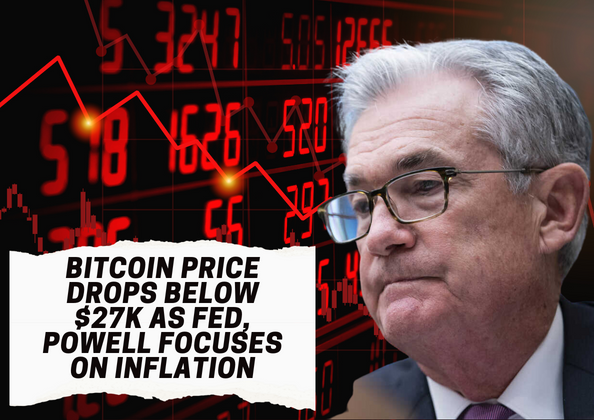Bitcoin (BTC) dropped below $27,000 after the U.S. Federal Open Market Committee (FOMC) raised interest rates by a quarter point, as expected. Fed Chair Jerome Powell said the FOMC is “strongly committed” to returning inflation to their 2% objective. However, the FOMC also acknowledged this month’s banking near-meltdown, saying that it is likely to result in tighter credit conditions for households and businesses, which could weigh on economic activity, hiring, and inflation. The rate increase and banking near-meltdown could have a negative impact on Bitcoin, as investors may be less likely to invest in the cryptocurrency.
Bitcoin (BTC), the largest cryptocurrency by market value, recently traded at about $27,030, down 4.1% over the past 24 hours. Despite the recent drop in price, some analysts remain optimistic about the future of BTC, citing the bank sector’s calamities as a potential catalyst for growth. James Lavish, managing partner at Bitcoin Opportunity Fund, believes that BTC has benefited from the recent turmoil and now has the potential to benefit from the Fed’s potential end to its year-long diet of hawkish interest rate increases. With the bank sector in turmoil, BTC may be seen as a financial lifeboat, making it a potentially attractive investment for those looking for a safe haven.
The recent banking crisis has caused volatility in the markets, and the recent rate hike is expected to add more stress to the banking sector. Crypto asset manager Hashdex believes that this rate hike is a negative for risk assets, but a positive for Bitcoin and gold. Emurgo Fintech’s managing director believes that banks are struggling and authorities are having to inject liquidity to shore up the financial sector. Investors are realizing that deposits in banks can feature major counterparty risk, and this is causing them to rethink what it is to actually own assets. Bitcoin and gold are seen as safe havens in this uncertain economic climate.
Ether (ETH), the second-largest cryptocurrency by market value, was recently trading around the $1,740 level, down 3.1% from Tuesday. Ripple’s XRP token was down 11%, after earlier in the day jumping 20% on reports Ripple was well-placed to win a landmark case against the U.S. Securities and Exchange. The CoinDesk Market Index, which measures overall crypto market performance, was recently up 4%. Traditional markets fell slightly following the Federal Reserve announcement, with the S&P 500, Dow Jones Industrial Average (DJIA) and tech-heavy Nasdaq all closing down 1.6%. The two-year Treasury bond rate fell to 3.93%. Cryptocurrency markets have been volatile in recent weeks, with Ether and XRP both experiencing significant price swings.
The US Federal Reserve has decided to keep interest rates unchanged after February’s consumer price index (CPI) data showed a drop in month-over-month inflation to 6% from 6.4%. Core data, which excludes volatile energy and food costs, also decreased slightly. This suggests that the Fed’s measures are slowly helping to contain inflation, and that the central bank may have overstepped in recent months. Meanwhile, the labor market remains strong, with a decrease in weekly US jobless aid claims.
The Federal Reserve’s decision to raise interest rates by 25 basis points has been met with mixed reactions from the crypto asset market. While some investors are bullish on the potential for a mini bull run, others are more cautious, citing the potential for further rate hikes if inflation is not tamed. IDX Digital Assets Chief Investment Officer Ben McMillan noted that bitcoin is now being seen as a store of value, similar to commodities or hard assets. Umee CEO Brent Xu warned that a pullback could be in store if the Federal Reserve continues to hike rates. Ultimately, investors should remain cautious and monitor the situation closely.













